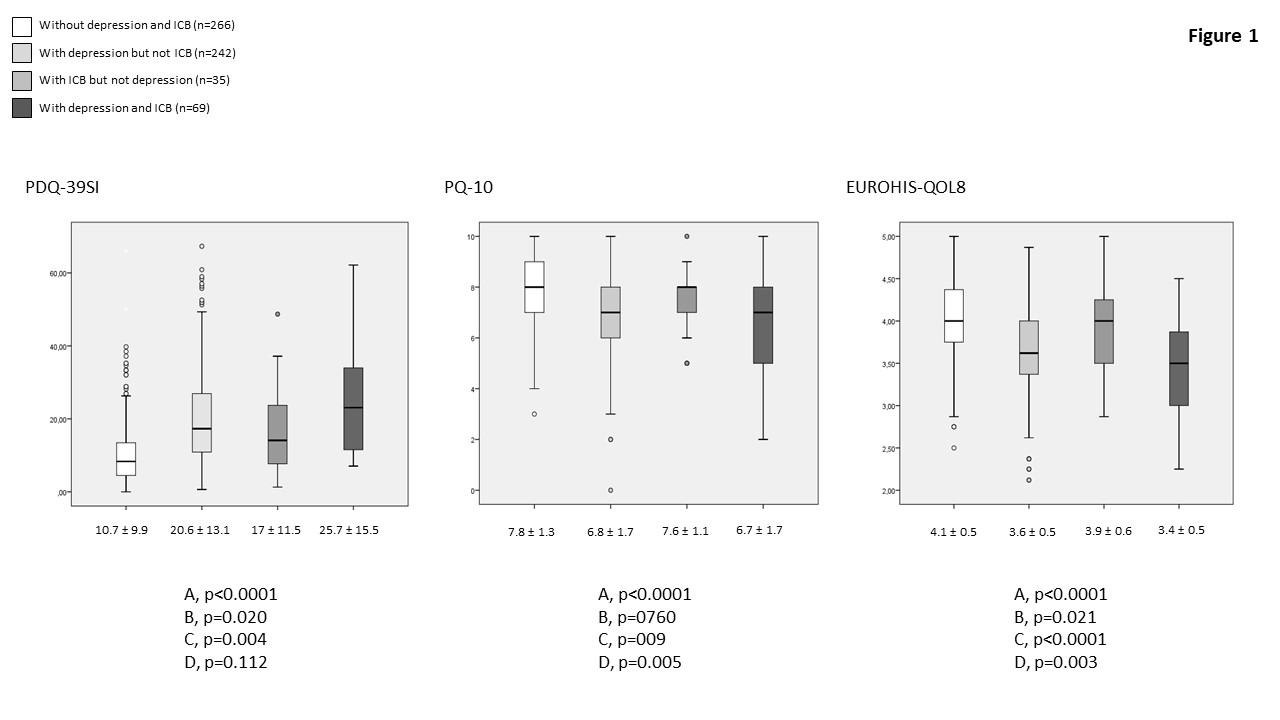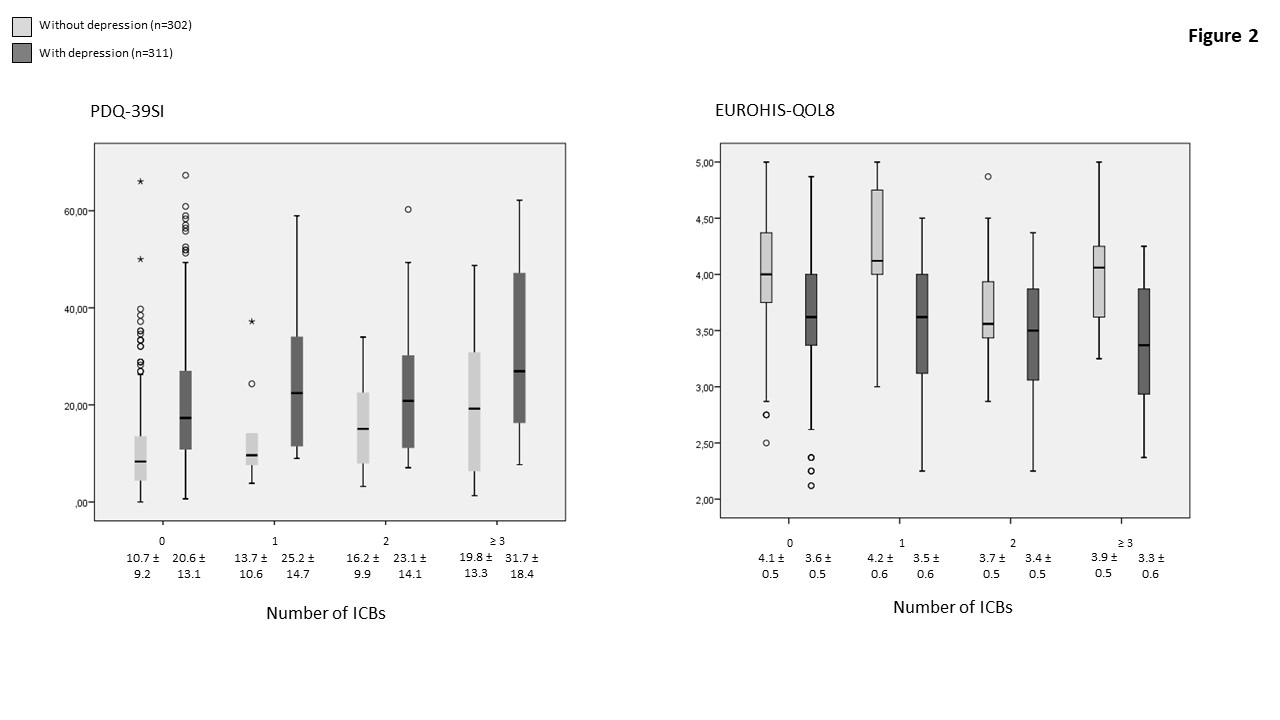Category: Parkinson's Disease: Non-Motor Symptoms
Objective: To analyze quality of life (QoL) in Parkinson´s disease (PD) patients regarding to have depression, impulsive-compulsive behaviors (ICBs), or both.
Background: Depression and ICBs are both common in PD patients, and their coexistence is frequent. This relationship between mood and ICBs is important due to the fact that both impact negatively on quality of life (QoL) of the patient.
Method: PD patients recruited from 35 centers of Spain from the COPPADIS cohort (1,2) from January/2016, to November/2017, were included in the study. The QUIP-RS was used for screening impulse control disorders (ICDs) (cutoff points: gambling ≥6, buying ≥8, sex≥8, eating≥7) and compulsive behaviors (CBs) (cutoff points: hobbyism-punding ≥7). Mood was assessed with the BDI-II and QoL with the PDQ-39 (health-related), PQ-10 and EUROHIS-QOL8 (global) questionnaires. QoL was determined in different groups: 1) PD patients without depression and ICB (n=266); 2) PD patients with depression but without ICBs (n=242); 2) PD patients with ICBs but without depression (n=35); 4) PD patients with both depression and ICBs (n=69). A patient suffering from at least 1 ICD and/or CB was considered as a patient with ICBs.
Results: Considering the four groups, QoL was worse in those patients with both depression and ICBs (figure 1-analysis A). QoL was worse in patients with depression and ICBs vs those with ICBs but not depression (figure 1-analysis C). However, when patients with depression but not ICBs vs those with ICBs but not depression were compared, only global QoL was significantly worse in the first group (figure 1-analysis D). Health-related and global QoL was worse in patients with depression and ICBs vs those with only depression (figure 1-analysis B): PDQ-39SI, 25.7±15.5 vs 20.6±13.1 (p=0.020); EUROHIS-QOL8, 3.4±0.5 vs 3.6±0.5 (p=0.021). Only health-related QoL was related to number of ICBs in both groups, PD patients with (p=0.009) and without depression (p=0.001) (figure 2; a trend of significance for EUROHIS-QO8 was observed [p value of 0.052 and 0.057, respectively).
Conclusion: In PD patients with depression, to suffer from ICBs could be associated with a worse QoL. In depressed PD patients, it is advisable to ask about ICBs and viceversa.
References: 1) Santos-García D, Mir P, Cubo E, et al.; COPPADIS Study Group. COPPADIS-2015 (COhort of Patients with PArkinson’s DIsease in Spain, 2015), a global–clinical evaluations, serum biomarkers, genetic studies and neuroimaging–prospective, multicenter, non-interventional, long-term study on Parkinson’s disease progression. BMC Neurol 2016;;16:26. 2) Santos García D, Jesús S, Aguilar M, et al.; COPPADIS Study Group. COPPADIS-2015 (COhort of Patients with PArkinson’s DIsease in Spain, 2015): an ongoing global Parkinson’s disease project about disease progression with more than 1000 subjects included. Results from the baseline evaluation. Eur J Neurol 2019;26:1399-1407.
To cite this abstract in AMA style:
D. Santos, T. de Deus, E. Suárez, L. Vela, M. Catalán, M. Álvarez Sauco, I. Gastón, M. Avila, P. Sánchez Alonso, M. Alonso Losada, N. López Ariztegui, M. Seijo, C. Valero, J. González, S. Jesús, Ll. Planellas, J. García Caldentey, N. Caballol, B. Vives, J. Hernández Vara, I. Cabo, I. González Aramburu, V. Nogueira, C. Borrué, B. Solano, S. Escalante, E. Cubo, F. Carrillo, J. Kulisevsky, L. López Manzanares, M. Kurtis, M. Kurtis, P. Mir, P. Martínez Martín. Quality of Life in Parkinson´s Disease Patients with Depression and Impulsive-compulsive Behaviors [abstract]. Mov Disord. 2020; 35 (suppl 1). https://www.mdsabstracts.org/abstract/quality-of-life-in-parkinsons-disease-patients-with-depression-and-impulsive-compulsive-behaviors/. Accessed October 15, 2025.« Back to MDS Virtual Congress 2020
MDS Abstracts - https://www.mdsabstracts.org/abstract/quality-of-life-in-parkinsons-disease-patients-with-depression-and-impulsive-compulsive-behaviors/


